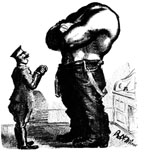
A ‘Tyrannical Minority’
GUEST COLUMN
In the U.S. we are witnessing the onslaught of a “tyrannical minority” intent upon imposing their views on the rest of us. This minority is comprised of several special-interest groups, as well as a small handful of individuals with chips on their shoulders. Their self-righteous goal is to sanitize our public space of any mention of God or faith. However, their crusade is more akin to a Shermanesque march across the face of the U.S. Constitution, an act with far-reaching implications if allowed to prevail. This minority is seeking to undermine the straightforward meaning of the First Amendment.
The “tyrannical minority” has focused their attacks on the supposed widespread violations of the principle of “separation of church and state” found in the Constitution. However, it would seem that very few people actually read our Constitution before speaking on this issue, for if they had, they would see that the phrase “separation of church and state” is not in the Constitution. The term itself was coined by Thomas Jefferson in his 1802 letter to the Danbury Baptist Association, wherein he refers to “a wall of separation between Church and State.” The letter certainly affirms the First Amendment tenet that government has no business interfering with an individual’s faith and practice thereof, but the “tyrannical minority” has twisted this phrase into a campaign slogan to serve their purposes.
The First Amendment of the U.S. Constitution states, “Congress shall make no law respecting an establishment of religion, or prohibiting the free exercise thereof….” The primary concern of late-18th-century America was its experience with Europe, specifically the Church of England that dominated Great Britain, and the Catholic Church that dominated much of continental Europe. The colonists immigrated to America (Pilgrims, et al.) in large part to escape these institutions. As such, the First Amendment protects the free exercise of religion, and blocks any attempts at establishing a state-dominated national religion.
You May Also Enjoy
The Byzantine Option... The Obvious Choice: A Nun... Ask Pointed Questions... The Hand That Rocks the Cradle... Besieged by Mormons...
Cardinal Dolan told his Islamic audience, "You love God, we love God, and he is the same God," and he thanked them "for making me feel like a friend and a member of a family."
Love it, hate it, or have no opinion either way, the John Birch Society makes for a fascinating study and deserves a deeper historical understanding.

